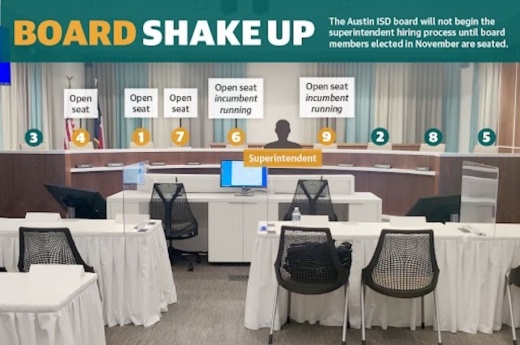The district plans to name a new superintendent in the summer 2023 and will not start the search until January, following the November election where five of the nine seats will be on the ballot.
“You see this superintendent turnover throughout the state, because superintendents are having to take on challenging issues like COVID-19, like masking,” said Anthony Mays,
acting superintendent and chief of school leadership. “You’re dealing with all of these polarizing challenges that come with us moving back into the schools from remote learning.”
The hiring process
Mays said superintendent duties range from everyday tasks including planning for aging infrastructure to responding to challenges such as protests.
Cathy Jones, executive director of the nonprofit Austin Partners in Education, said the job also involves soft skills, such as forming relationships and setting the tone for the year.
Jones said that Elizalde struggled to form these key relationships because in addition to the COVID-19 pandemic, she was hired by the board in 2020 before the November election, when almost half the trustees were replaced.
The search will begin after the new board is seated in January to give members a chance to unify behind the candidate, Trustee Arati Singh said. •During the last search, the board collaborated on a list of qualities and requirements it was looking for in a new candidate and used them as a guide through the process. The Austin community weighed in through an online survey, Singh said.
Singh said when the new board members are elected, they will have several key decisions to make such as if Mays will be asked not to run to encourage more candidates to apply.
Singh said that while the board ultimately votes on the superintendent, she would like to have a few selected community members be able to meet potential candidates and share their input.
To achieve transparency, AISD parent Cuitlahuac Guerra-Mojarro said he would like all candidate applications made public. Last time, AISD only publicly named a lone finalist.
Current law just requires the board to announce the name or names of the finalists being considered for the superintendent position 21 days before the final vote.
“If we want the kind of candidate that’s going to live out the values of our community, then we want a candidate that’s willing to engage in a sunshine process,” Guerra-Mojarro said, referring to an open process.
The costs of inconsistency
Over the course of the 2021-22 school year, Elizalde and other district staff worked to draft a balanced budget for the upcoming school year after facing up to an $80 million deficit. To achieve this, AISD cut more than 600 staff.
While it is unclear how expensive the search for a new superintendent will be, Jacob Reach, AISD chief of governmental relations and board services, said the four-month long search to hire Elizalde cost the district $45,000. The 2023 search will take about six months.
Reach said that whether superintendent turnover itself has negative effects on the budget is difficult to quantify. Elizalde had the third-highest salary among Travis County superintendents at $342,756, according to Texas Education Agency data, falling behind Kipp Texas Public Schools and Lake Travis ISD. However, AISD is the largest school district in Travis County, and Elizalde’s salary accounted for 0.02% of the annual budget, he said.
With three superintendents in the last five years, some worry about less tangible costs to the district.
“When you don’t have strong consistent campus leadership ... [it’s] hard to retain quality teachers and to deliver high-quality instruction,” Guerra-Mojarro said.
Looking ahead
Though Singh said the board is planning on improving the future of AISD by taking adequate time during the next superintendent hiring process, considering transparent hiring practices and starting to gain trust with the community, the long-term effects of the pandemic and heavy workload on school staff remain a concern to finding stability.
Jones said the pressure to be the face of the community and to manage thousands of students causes trends in burn-out for superintendents.
“There is no work-life balance from my perspective,” Jones said. “Most urban superintendents don’t last more than three years.”
However, Mays said he is confident that he and his team will be able to manage the school year.
Mays said he is looking forward to addressing families’ concerns, such as safety, and collaborating with campus leadership.
“I don’t think any of us are immune to what we are still recovering from, and I think that it’s really going to take everybody reflecting and connecting to be able to get back to a place of stability and normalcy,” Mays said.





